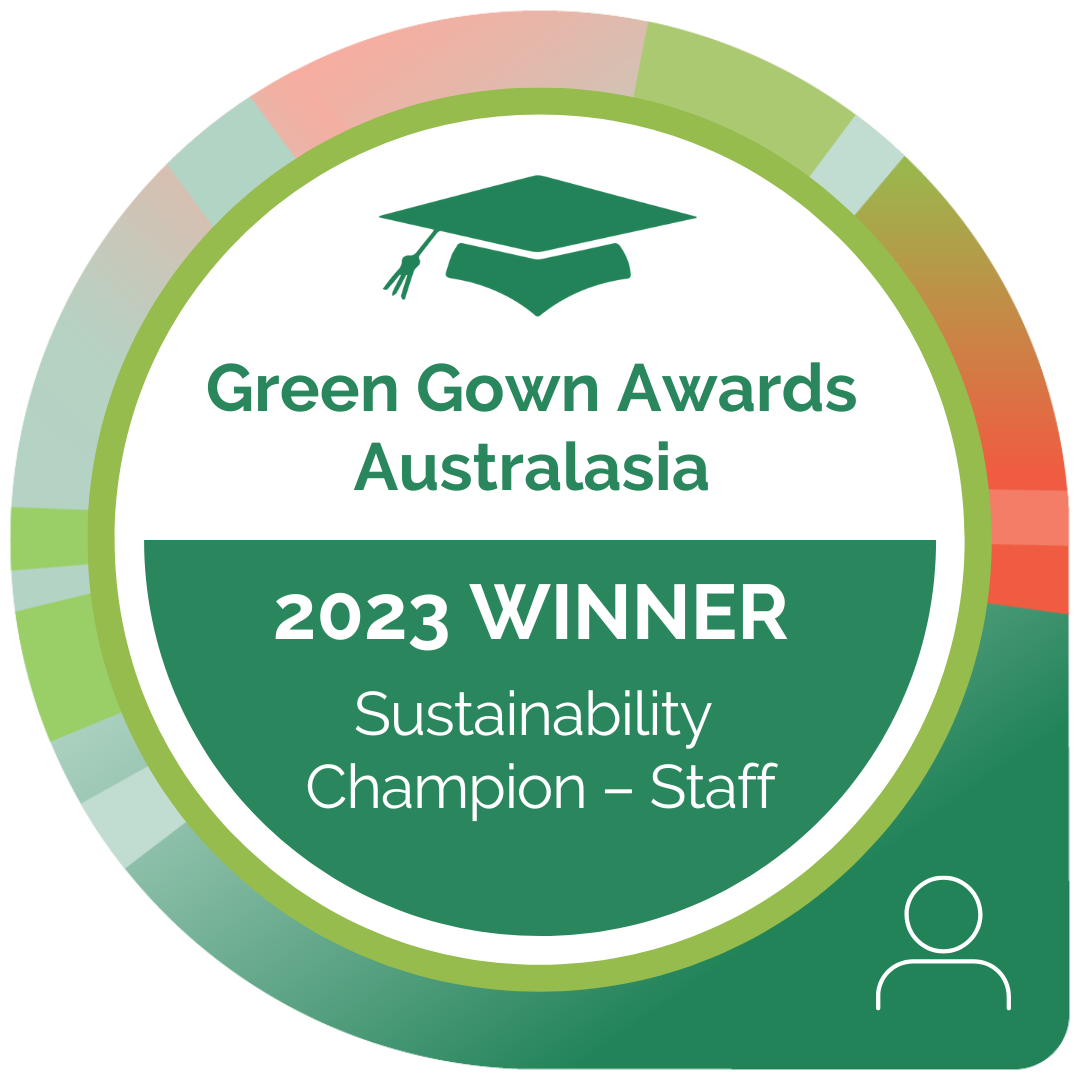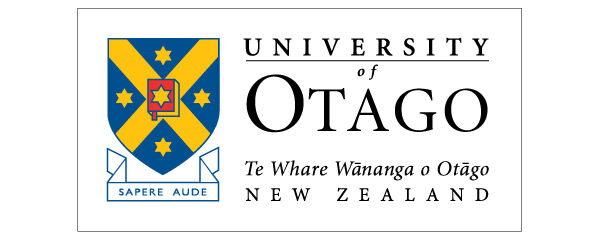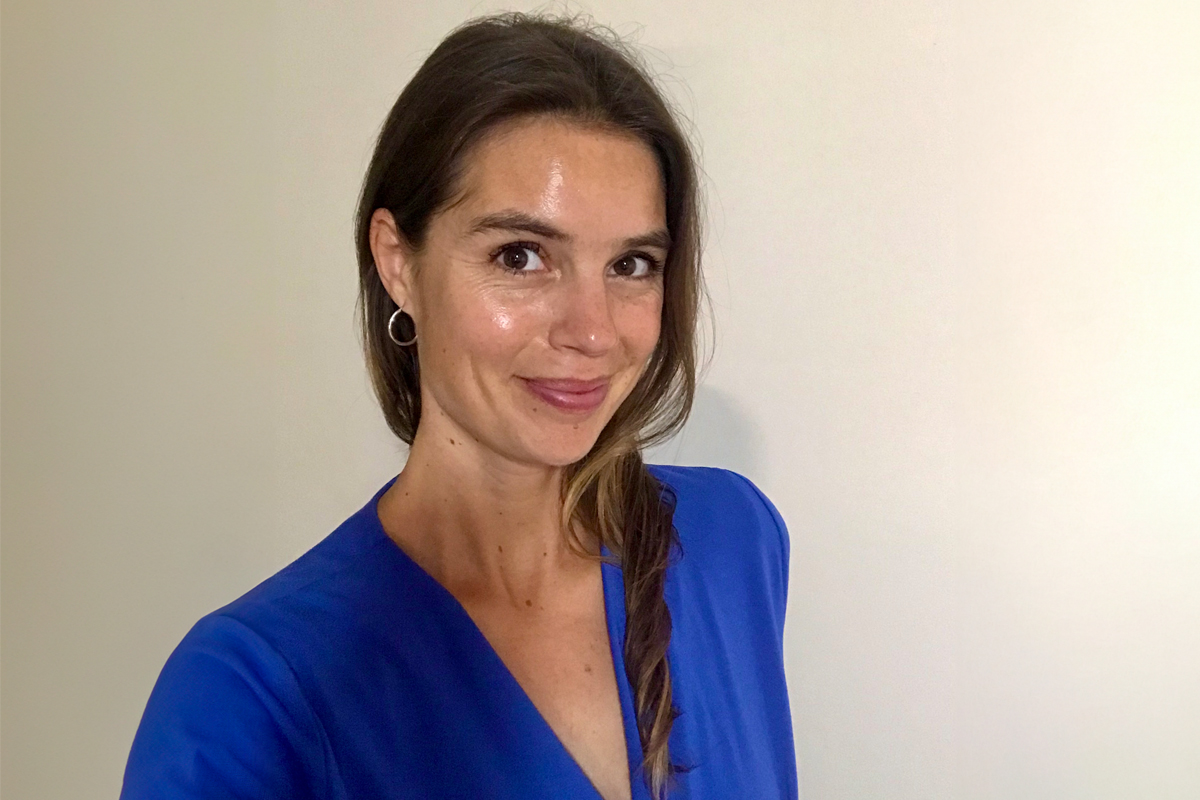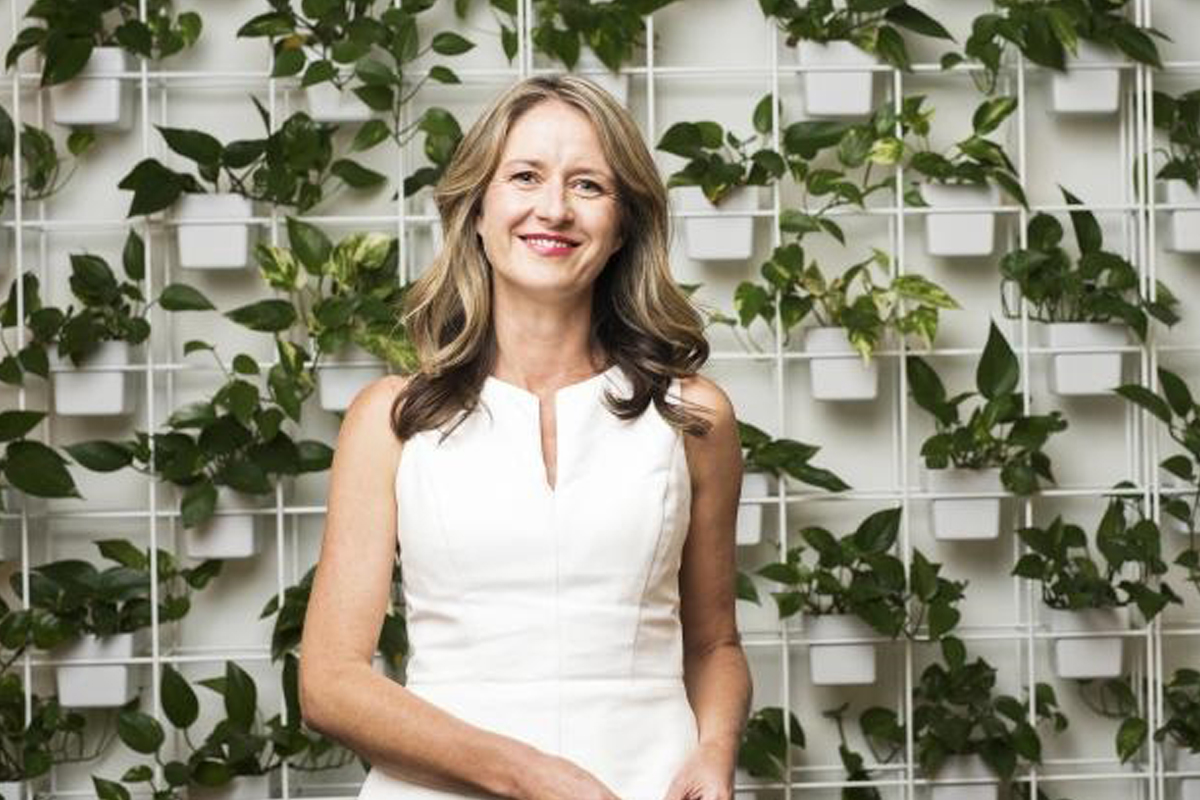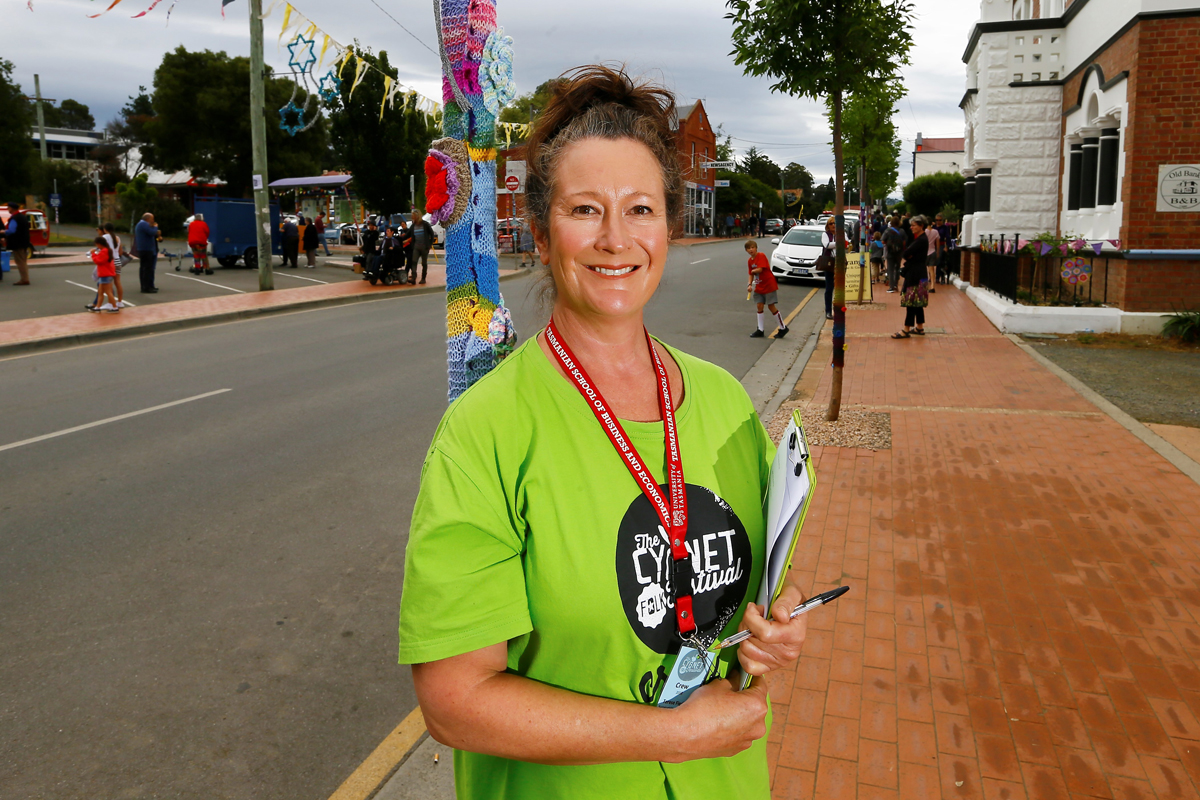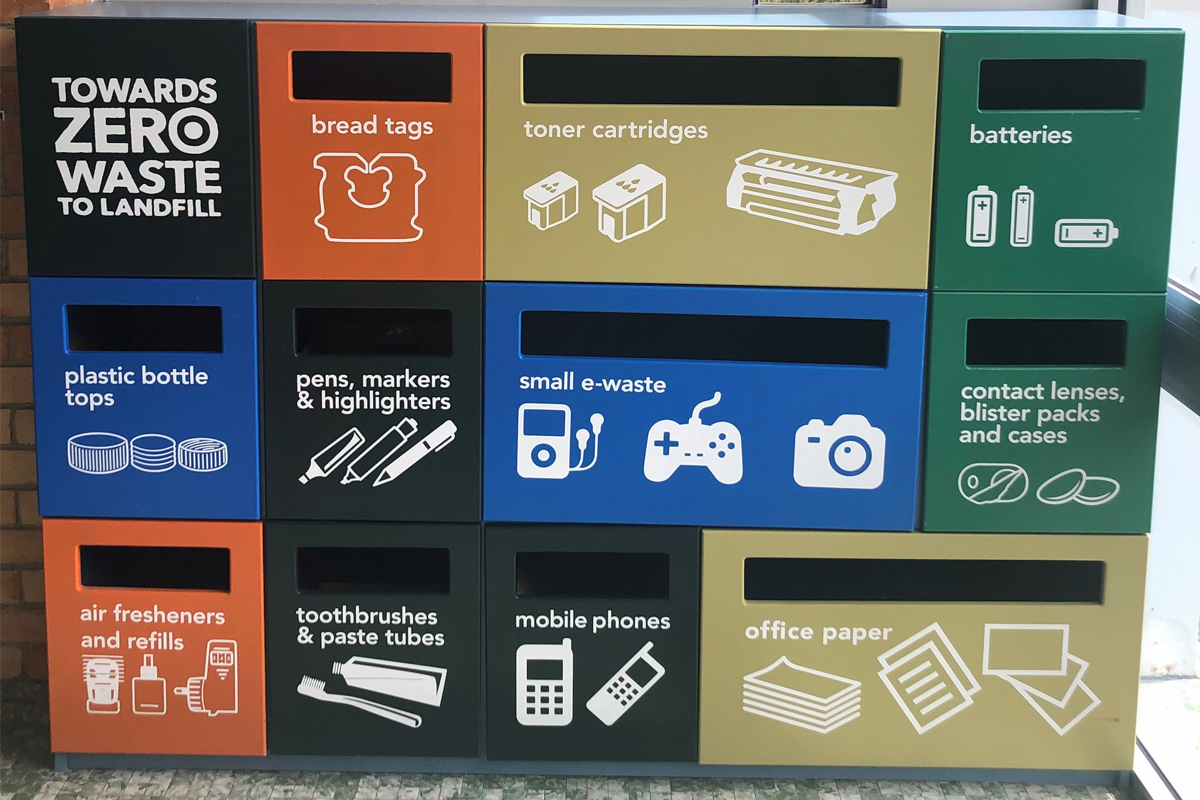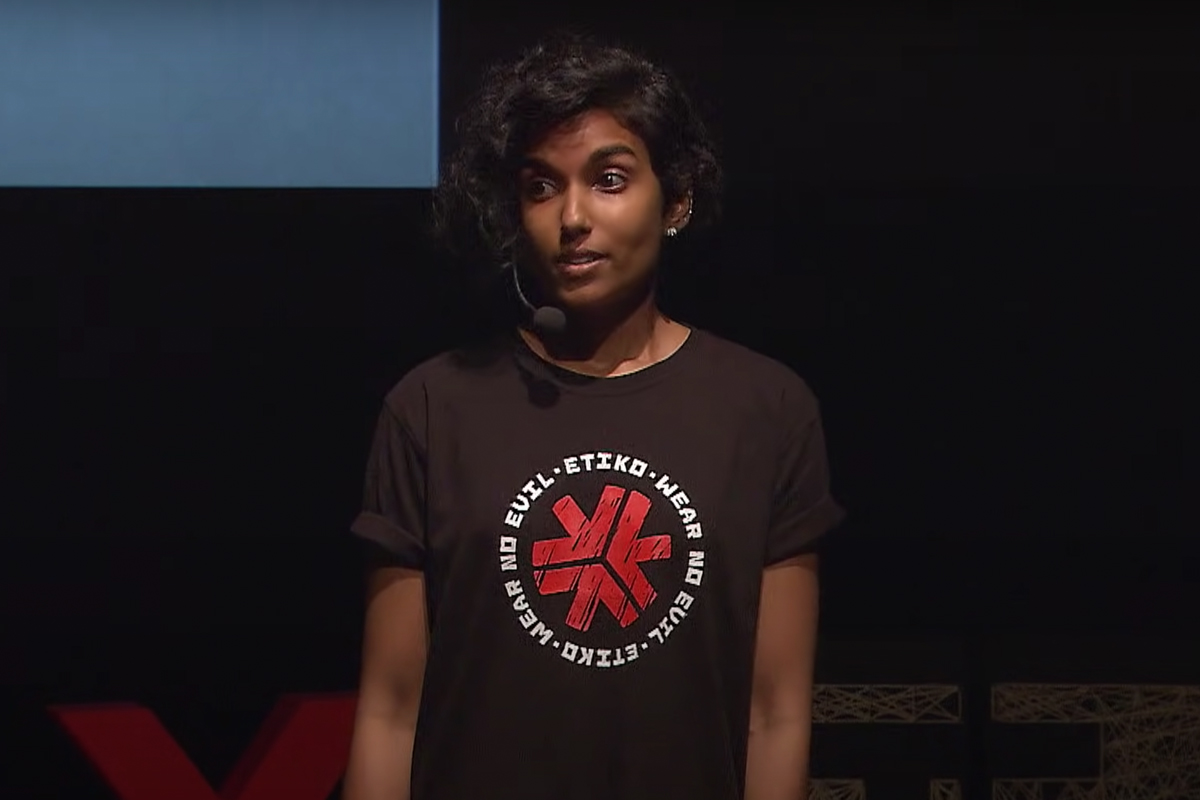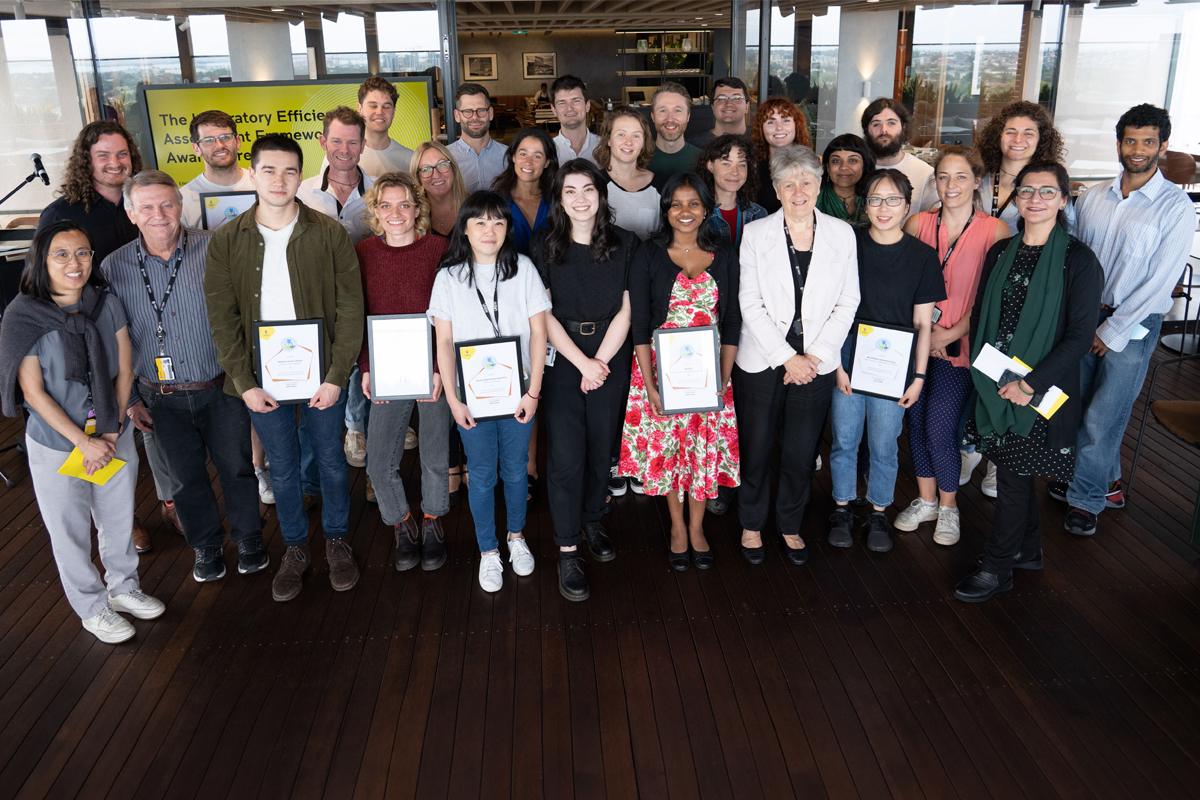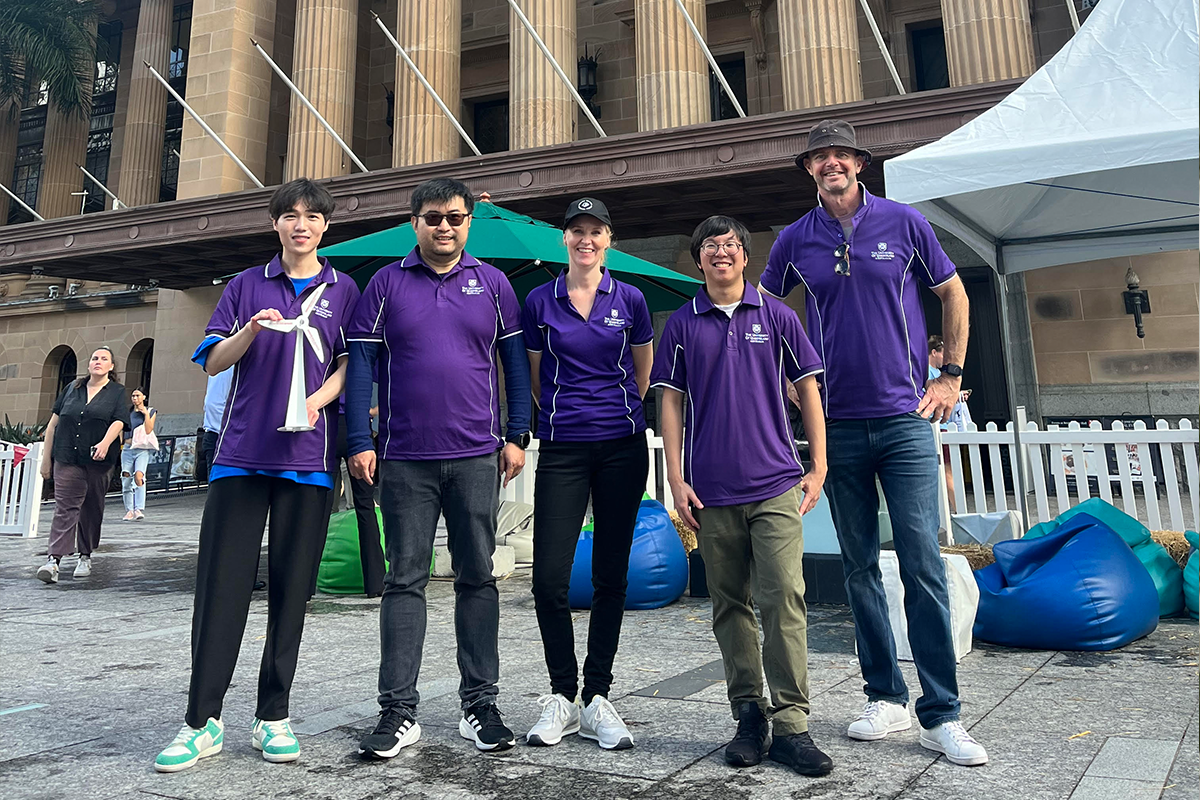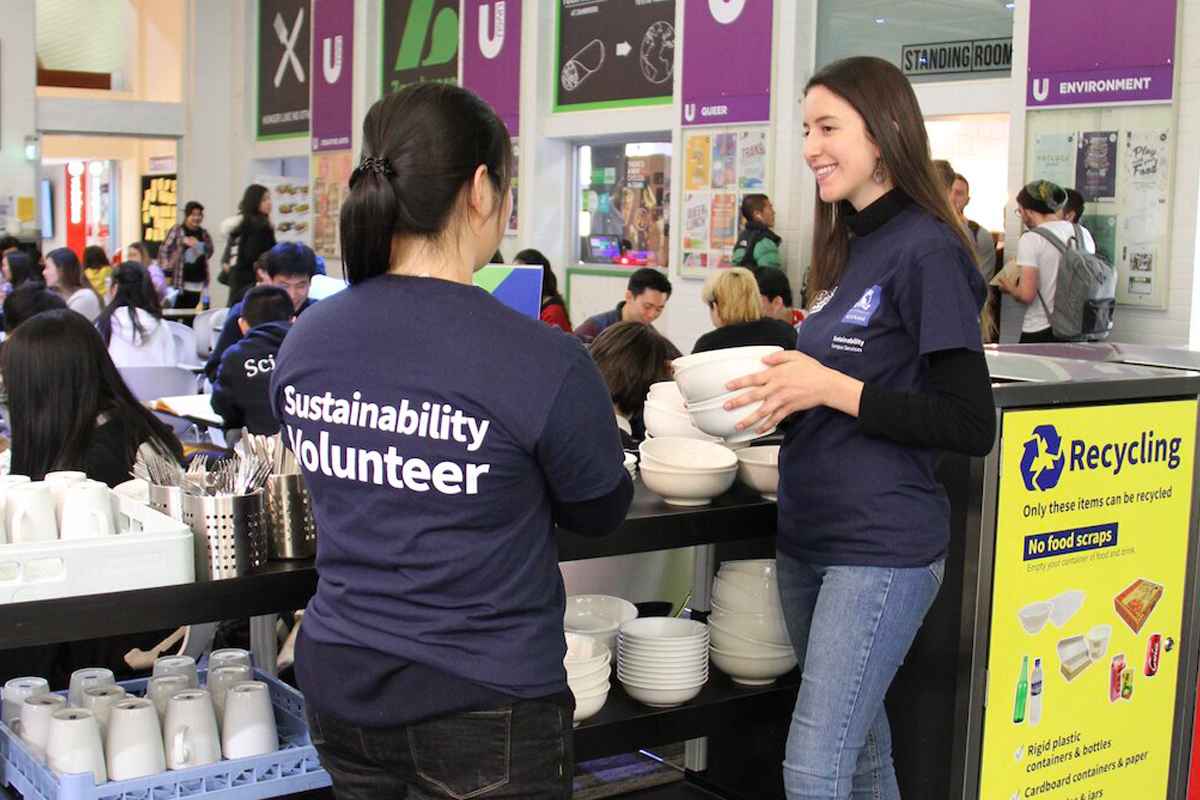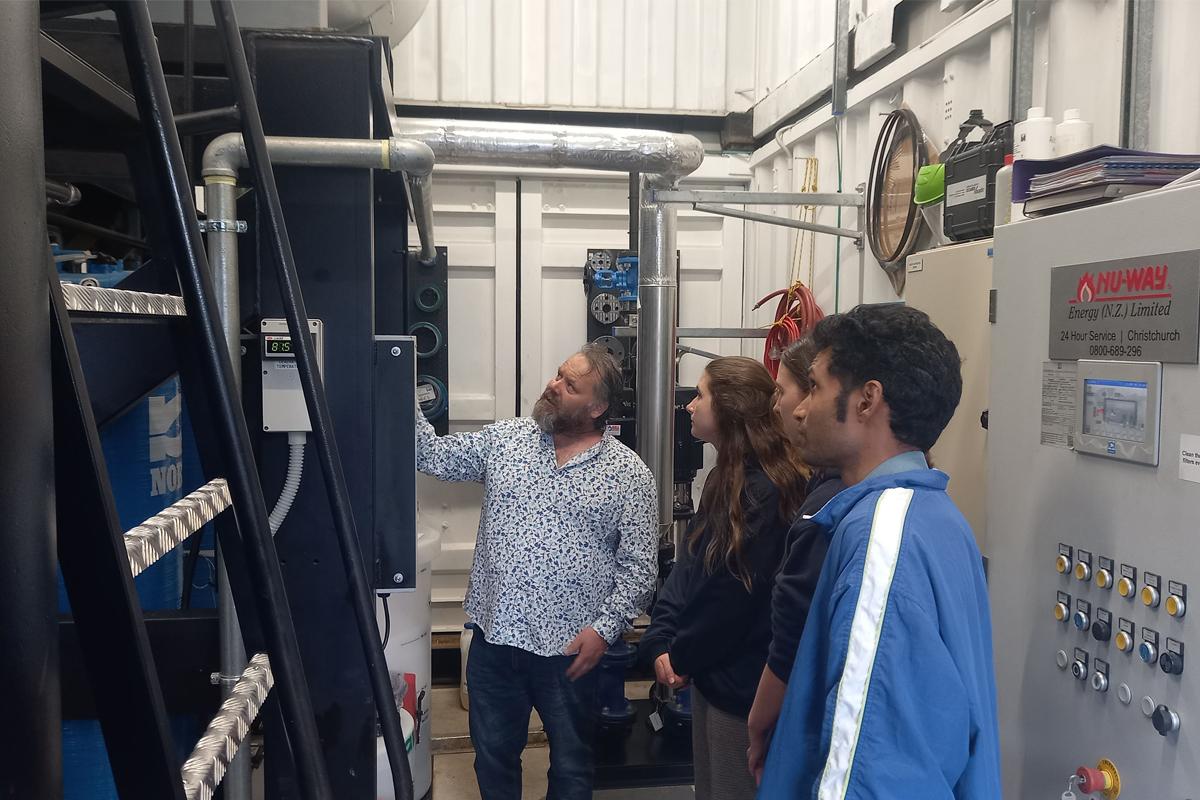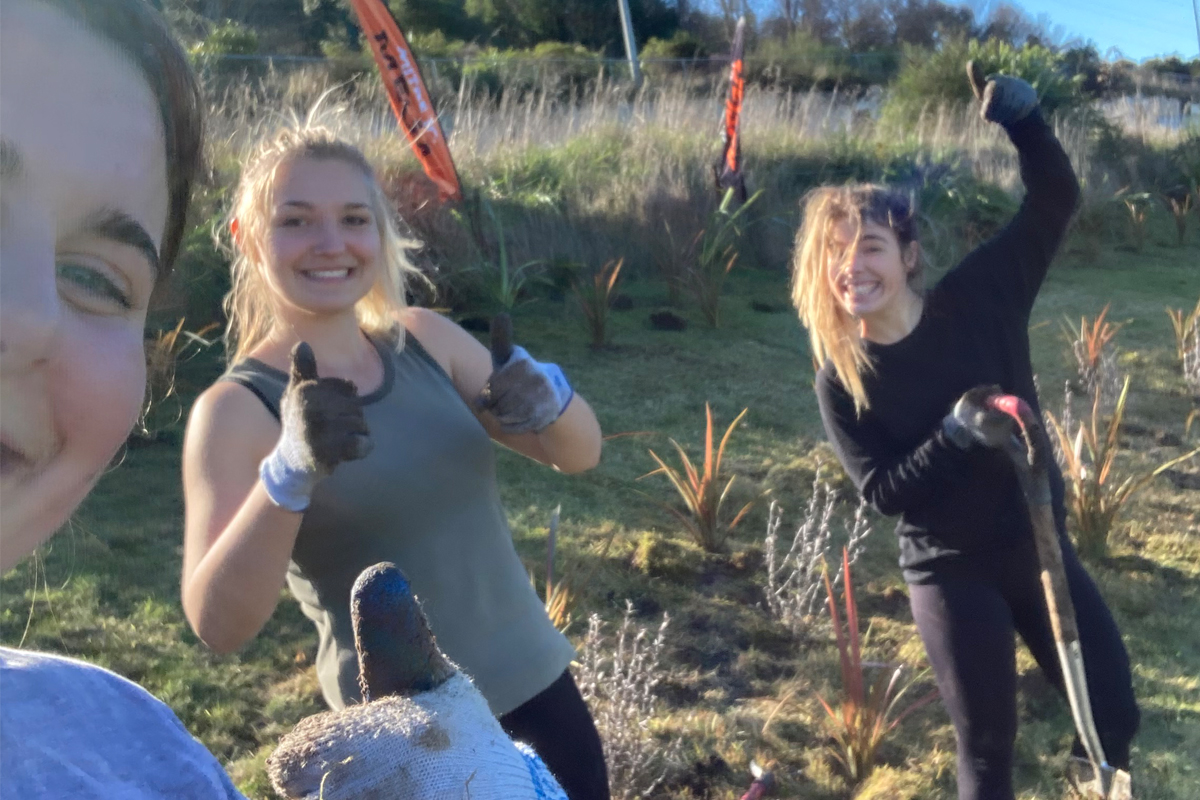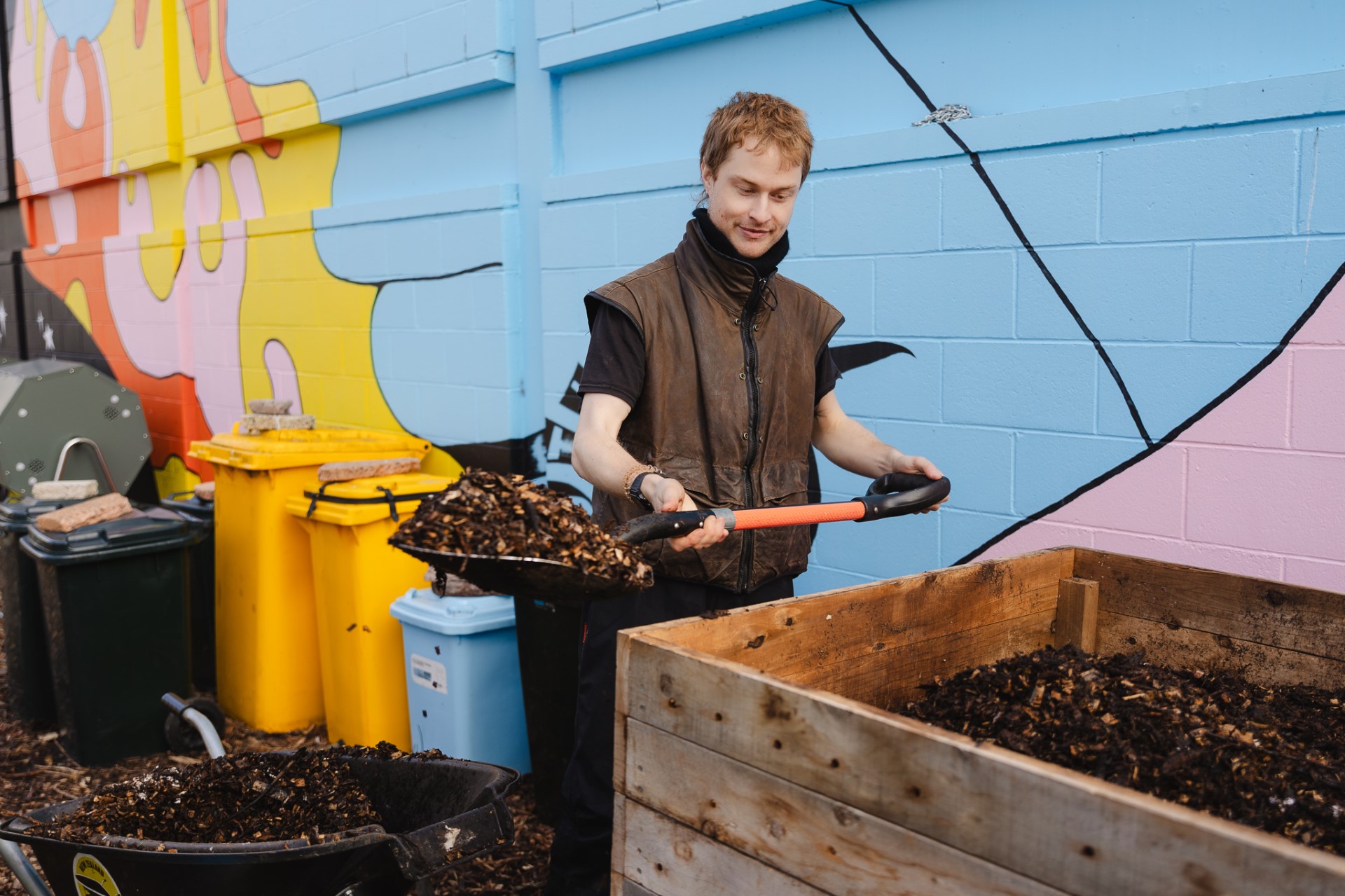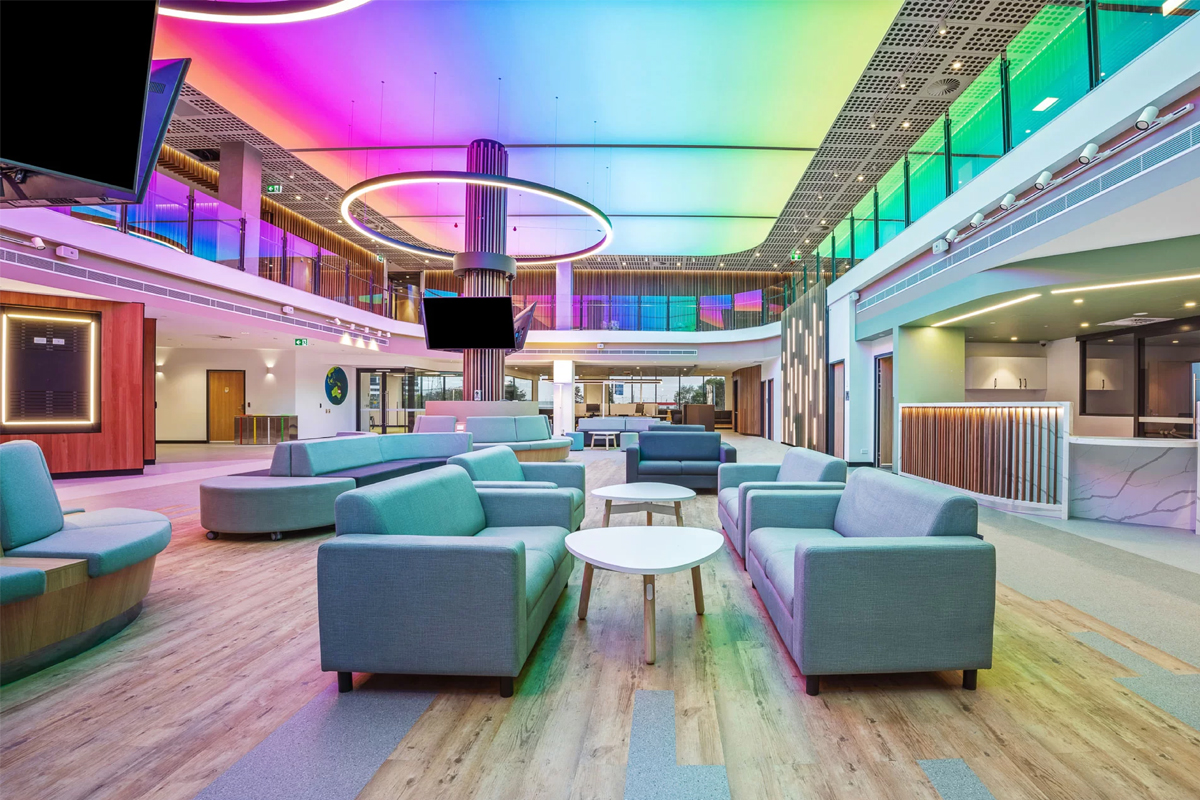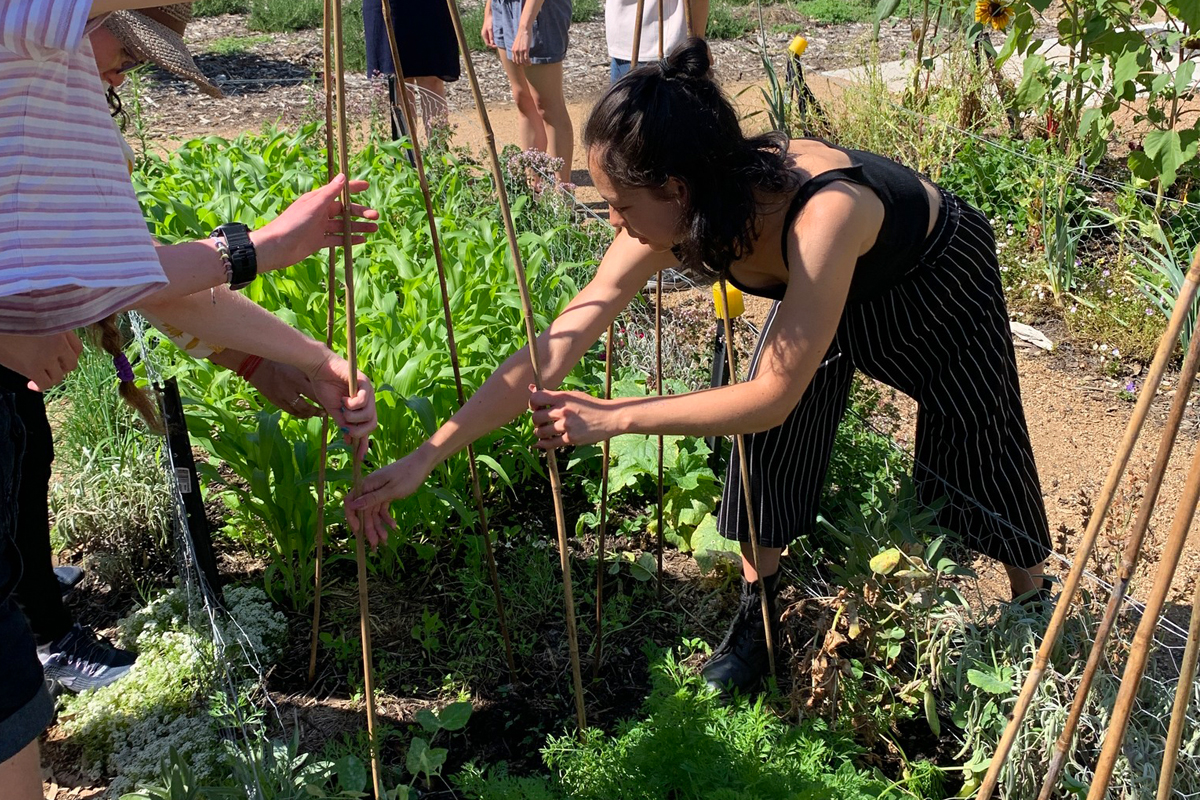Sustainability Champion – Staff/Winners category
“Jes deserves to win because since 2019 she has created a diverse portfolio of initiatives that have real impact, and are often above and beyond the role she was employed to do in our University of Otago Sustainability Office. Rather than deliver an event off of a prescribed calendar, Jes has an uncanny ability to take a good idea, break it apart, look at it through different lenses and produce something with greater impact, that resonates much more with the target audience.”
Ray O’Brien, Tumuaki o Toitū te Taiao.
Here are some examples to support this statement:
- When our Te Whare Wānanga o Ōtākou (University of Otago) was about to host the 2019 ACTS conference, the incumbent Head of Sustainability resigned. As the only person left in the Sustainability Office, I picked up a range of responsibilities and expectations well above the role I had held for only a few months. This was a great challenge to pick up. I managed to gain support from other teams, opened collaboration with the Otago Polytechnic, drew on an extended group of student volunteers, and delivered an outstanding event at extremely short notice.
- Green Impact was supposed to be implemented at our University in 2018 (as part of the three-year strategic plan) but several delays meant it was also looking unlikely to be delivered in 2019 either. I came on board and was given the autonomy to implement the programme. The now Head of Sustainability said that “[my] authentic personality, gentle humour and genuine belief in sustainability attracted supporters who rallied to get the launch across the line, then she led the implementation with minimal resources and without a manager”. Several teams participated, which forged relationships. And, for the first time there was a much wider awareness of the Sustainability Office across our University.
Green Impact is a great scheme, but staff and student feedback indicated it was not the best fit at Otago. This was another good challenge to developing a new programme based entirely on that feedback (less administration, more flexibility, more support, and more clearly positioned in Aotearoa/New Zealand). From there Green Your Scene (GYS) was born. This programme was supported by bespoke resources that I have continued to improve and iterate. Specific GYS programmes now engage Work Places, Residential Colleges, Kitchens, and Food Outlets while another will be added later in 2021 for events.
During the Covid-19 lockdown, I continued engagement with GYS teams included creating a wellbeing focus for activities to support staff and students in lockdown in residential colleges, flats and homes. As described below in “impact,” this programme was a huge success.
The scheme continues to evolve and is now morphing into what looks more like a micro barging framework that allows maximum flexibility though a series of mini courses.
- In my first year (2019), I developed an extensive network of student volunteers to power the Sustainability Office’s work. This number of volunteers comes with a cost – the time to organise them. I successfully gained funding to establish a two-tier system, now our Sustainability Office employs six Tētēkura (Student Leads) part-time to manage the student volunteers. The Tētēkura is the carved prow of a waka (canoe) and our Office of Māori Development gifted this name to represent the leadership role of these students. The portfolio of engagement activities that have developed from this initiative is both diverse and extensive. The impact of the Tētēkura is described in the section below.
- One of the hardest tasks to get right for a Sustainability Office is how to best tell the story of sustainably to such a diverse audience of students. I think strategically, tactically and technically about solutions to this challenge. I have produced an engagement plan that guides our communication at a strategic level, she uses a range of media channels and strategies to get the best effect. I regularly receive feedback from other organisations that the media assets are “technically outstanding” [communications advisor]. These assets are most easily accessed through our Instagram or Facebook The impact of this high-quality engagement is described below.
- Our 2017-2022 Sustainability Strategic Framework had a significant weakness – it did not speak loudly to the bicultural expectations of universities in Aotearoa/New Zealand. I the words of the Head of Sustainability “Jes has recognised this and provided role model practice in how to integrate Te Ao Māori perspectives into the work of the Toitū Taiao (Sustainability Office)”. I have done this by integrating Te Reo Māori (The Māori language) and Tikaka Māori (protocols) into events, resources, meetings, and conversations. I have helped establish the credibility of the Sustainability Office with the Office of Māori Development, who have been our partners in developing the next iteration of our University’s Sustainability Strategic framework: Tī Kōuka 2030.
- Dunedin is a university city and collaborations across the community are essential. I have brought a strong network of connections from my previous role (Department of Conservation Community Ranger) and have continued to develop that network to increase our impact. This network includes Malcam Trust (which helps youths transition to meaningful and balanced lives), Dunedin Pride, a range of local sustainable businesses in food and fashion, the Social Impact Studio, Dunedin City Council, and local conservation groups such as Predator Free Dunedin.
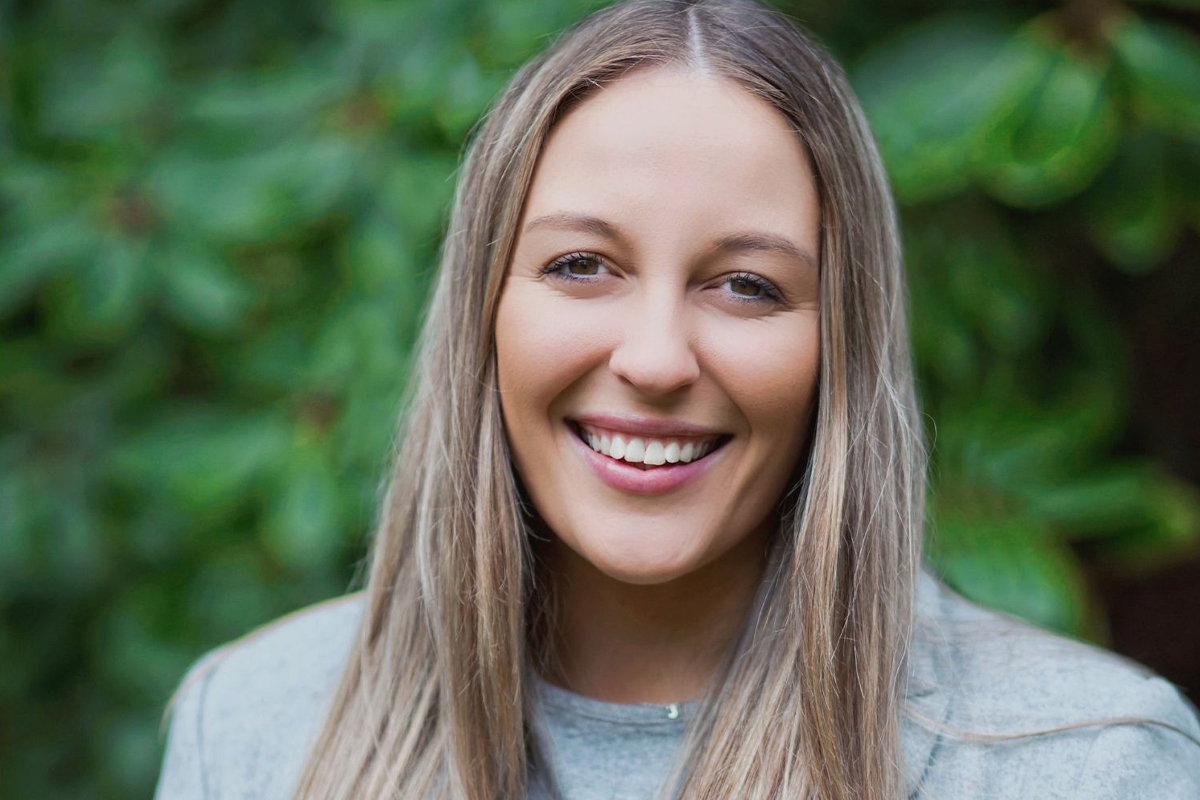
Impact and benefits
The following evidence supports the impact of my work (described above). External evidence is hyperlinked.
ACTS Conference
Successful delivery of the conference, student volunteers gained ideas from other institutions, and our University raised the profile of sustainability both internally and externally.
Green Your Scene
Because of the COVID-19 disruption, I changed the marking criteria to support teams to keep working together. Several teams were identified as above and beyond even Kowhai. Initiated and supporting all these. The outstanding awards went to projects such as a step count challenge that had staff walk virtually across Europe in non-work time, establishing and nurturing a shared community garden, gathering recipes and publishing ‘The College Vegetarian Cookbook’, a café’s commitment to being disposable cup free and enabling sustainable changes,, a college students’ possum trapping project which was recognised by New Zealand’s Minister for Conservation, and Recreation Services staff for the ‘Sustainable You’ framework which integrated Te Ao Māori (Māori worldview) and sustainability principles into a wellbeing programme.
The running total of impact since 2020 is: 6,464 sustainable actions completed, 153 teams involved, and 23 sustainability projects completed
Tētēkura
I have created the annual opportunity for six Tētēkura/Student Leads to be employed as part of the Sustainability Office team, to support and improve our University’s culture of sustainability. This offers our students work experience and the chance to invest their passion for sustainability into designing and creating positive changes on campus from the ground up. It’s been a real pleasure to provide leadership to help Student Leads to focus their impact on the Sustainable Development Goals and our Sustainability Strategic Framework, all while challenging the norm, thinking outside the box, and working collaboratively with our Sustainability Office. The Tētēkura have produced a “Sustainability Sussed” podcast, regular Waste Diversion Days, Street Clean ups as part of the Sophia Charter, Movie Nights, ‘Unpacked’ events, Social Media takeovers, a regular central campus stall, and a drop in “good chats”. The Tētēkura’s impact has been transformational in terms of our reach through student-to-student communications. This would not have been possible without my initiative beyond the tasks I was employed to do.
The most recent iteration of this engagement is the sustainability Social Club, which is tapping into a whole new group who want to engage with sustainability activities in a positive way, that will enhance their wellbeing rather than add weight to their anxiety.
Toitū Te Whenua, Sustainability Week
In 2020, I focussed the week on resetting after lockdown, encouraging our staff and students to “Reboot”. The 19 events over five days included a skip diversion day, Sustainability Market, bike grab, sustainability pub quiz, recycling centre garage sale, Lorax movie night, social media takeovers, submission writing and connections to funding for good ideas. For the week, we collaborated with 22 groups, organisations and businesses, engaged with more than 500 students and reached 200 staff, while social media promotions reached about 7,200 people. Diversion Day diverted six tonnes of glass, two skips of cardboard and eight loads of cans as students sorted their waste.
In 2021, I encouraged our community to ‘Be a Legend’, while deliberately pushing boundaries to create a more inclusive notion of ‘legend’. She created an offering of 16 events over seven days to capture SDGs in a different light. Over this week, she collaborated with 38 groups, organisations and businesses, engaged with more than 500 staff and students and sold out our Planet D Drag Show in five days, attracting 140 to learn how SDG’s 3, 5 & 10 connect. The week’s other key activities included a meat-free campus day, sustainable living workshops and well-being events.
The week enabled staff and student involvement at the highest levels we had seen, especially with our social media promotion reaching about 7,950 people. Profits from Planet D were donated to Dunedin Pride (NZ$1,488) for Alphabet Soup, Rainbow Leaders and supporting our LGBTQIA+ youth. This has had a University-wide impact on understanding that sustainability goes beyond the ‘green stuff’ and triggered many of the challenging conversations about inclusiveness and equity that need to happen to see the transformation we want.
Since covid disruption we have learned to not put all of our eggs in one basket. We have now shifted to Te Oraka Social Club – more can be found about this in Te Oraka section. Stretching the load and the engagement with a focus on the Tētēkura’s wellbeing and my own capacity to avoid burn out.
Te Oraka – The Good Space
Te Oraka was recognised for it’s Student Engagement in the Green Gown Awards for 2022. In this space I have made efforts to build community through affordable and accessible sustainable solutions. Some of this work includes:
- Bike Grabs for koha
This collaboration shows sustainability’s full-circle scope. I collaborated with Southern Youth Development (SYD) and our Carrington College to establish the incredibly popular Bike Grab. Bikes reclaimed from landfill or abandoned on campus are repaired by Carrington residents with coaching from SYD staff. Then the bikes are sold to our University community for a small koha (donation) which goes back to the amazing team at SYD. This enables affordable access to sustainable transport. Over three Bike Grabs, 148 bikes have sold and $3,150 has been donated. Our team have another Semester of Bike Grabs locked in for 2023. With 80 per cent of students living within two km of campus, this higher profile for low emissions transport and easier access to it contributes significantly to the shift to more sustainable travel.
- Te Oraka Social Club
I established the Te Oraka Social Club for 2023 which was designed to grow a community nurtured by an educational events calendar. As of June 30 we have 119 students registered for the Social Club and have just launched our winter edition events calendar consisting of 7 events. New and existing events include workshops (e.g., breathwork, Mystery Bus trips, sewing workshops), clothes swaps, movie nights, clubs (e.g., makeup club with Dunedin Pride and Book Club), night markets and promoting staffs’ trial volunteering leave – to connect people to each other, new skills, and values.
- Thrift Store & Refill Station
I spend a lot of free time supporting our Tētēkura to maintain the stock sorting and displaying at Te Oraka thrift store. Our team share the goal that Te Oraka will not play the role between students/staff and the skip. This means we have set up a friendly sorting model for donations and allow people a free swap from the store for every three quality items we accept. This means Te Oraka remains tidy, hosts quality pre-loved items and is a fun and engaging space to be enjoyed by staff and students. In 2023 Te Oraka has processed just over $3,000 from selling pre-loved goods which has gone back into the space to support workshops facilitators, offer food at events and event supported donations. For example, we made a $510 donation to Ngāti Kahungunu to support their flood relief work after Cyclone Gabriel, this was raised through a $1 rummage sale that brought through approx. 200 showing up to support the cause.
Thrifty
I play a vital role in ensuring our Tētēkura are able to bring new ideas to the table and see them through to fruition during their time with us. Currently I am supporting our Tētēkura to deliver a gig on campus called Thrifty, to promote buying pre-loved and spending time with your friends without binge drinking. Our vision is to create a space where everyone feels welcome and can enjoy a chill night with their mates, listening to some local student bands and hosting local food trucks. There’s a huge demand for sober events, we see this with our Te Oraka Night Markets that bring in about 400 students on a Thursday night to enjoy oat milk hot chocolates and student stalls. We have four student bands signed up to be involved and just waiting to confirm our final artist on the lineup
My main role is making sure the event is low impact by offering diverse waste disposal streams, offering drink only in cans, promoting wearing thrifted fits and creating a safe and inclusive space for students to enjoy. I also designed a proposal to Pals – a popular zero sugar beverage option for students at Otago – for sponsorship with their zero-alcohol drink range. Through this proposal I was able to show how Pals kaupapa aligned with ours and they jumped on board to sponsor Thrifty.
Media and Comms
A key element of engagement is the story telling. Utilising social media and a strong brand has ensured successful engagement but became especially crucial over lockdown when during the COVID-19 nationwide lockdown hit.
I have spent a lot of time developing our approach to communication and growing our social media audience which currently totals to 3,945 followers across two Instagram accounts. I also developed a Sustainability Office brand guide which means we have a very recognisable look and feel. This includes branding for specific events. This level of media development and brand awareness is far beyond the expectations of my original role. This is well demonstrated in the video I led the production of to show the link between our work and the SDGs.
However, the most distinctive feature of the communications we have developed is the persistent positivity. If we are to communicate effectively, we also need to do so ethically. We know our students are suffering from anxiety more that any generation before them, so we must lead the transition to a more sustainable future with positivity. Our media is a powerful lever to either intensify that anxiety and create paralysis, or to support our student to take action and believe in their own impact. This can be seen in our regular Good News on Instagram.
Integration of Te Ao Māori
Through our engagement outputs, I have advocated and allied with our Māori community. We ensure all roles, projects, campaigns and new resources have a Te Reo (Māori language) translation and where appropriate we use the Te Reo Māori as the primary name (see our team job titles). Another great example is the collaboration we have developed with a local Māori artist (and Otago Alumn) to design our merchandise- The Māori Mermaid.
These small but notable steps are our starting point in bridging sustainability and indigenous knowledge together. The Sustainability Office work collaboratively with the Office of Māori Development at a strategic level. I was key in supporting student engagement and Māori student engagement in the development of Tī Koūka 2030: The Sustainability Strategic Framework. We also ensure projects and messaging is intertwined with tikanga, manakitanga, kaitiakitanga and mahi tahi at the very least, with our key message being “looking after papatūānuku (mother earth) and her tāngata (people)”. These are concept core to my practice.
Disposable Cup Free Campus
I spent 4 months of convincing, supporting and establishing an engagement strategy that provided comfort for the University Union to go disposable cup-free in July 2019. The three busiest cafés made the change, which had already prevented more than 25,000 cups from going to landfill as of December 2019. The change had been so well supported that the beginning of 2020 saw all campus outlets make the move and now some non-university cafes on the edge of campus are doing the same. I have now also extended this into a cup cycling scheme and helped convince tenant businesses to make the same shift.
Leadership and engagement
I have evolved my role as a Kaitakwaenga to lead the Tētēkura. I aligns this work directly to the Tī Kōuka 2030: University of Otago Sustainability Strategic Framework, the SDGs and Tiriti based collaborations across the Univeristy. I am now extending that influence as a representative on the University Equity Committee. This is a task that I have been supported in through the Otago Women in Leadership Programme.
However, the most distinctive feature of my work is the manner in which it is driven by positivity and wellbeing. We are the land and the land is us. If we do not treat ourselves well, we can not expect to be capable of driving change in our wider environment. I feed this through to our Student Lead team, ensuring that their wellbeing is first priority and remain flexible around their ever challenging study environment.
Wider societal impact
The collaborative nature of Jes’ work links the student and City communities in a common interest in a thriving future. This connectedness is the legacy of Jes’ work. These links in media are the best way to describe the extent to which Jes’ work reached out and engages with the wider community.
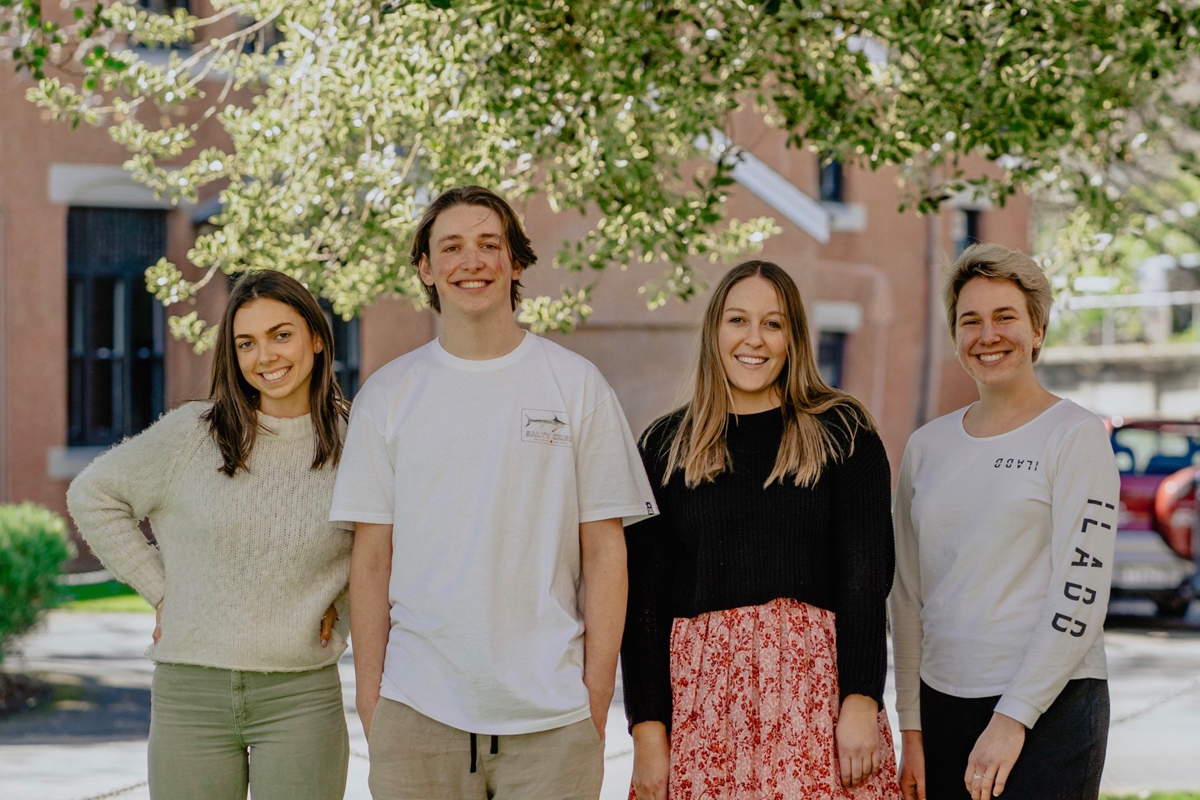
Related finalists
Climate Action/Winners
Climate Action/Winners
Benefitting Society/Winners
Benefitting Society/Winners
Sustainability Champion – Student/Winners
Sustainability Champion – Student/Winners
Creating Impact/Winners
Creating Impact/Winners
Sustainability Champion – Staff
Sustainability Champion – Staff
Sustainability Champion – Staff
Sustainability Champion – Staff
Creating Impact/Winners
Creating Impact/Winners
Leading the Circular Economy/Winners
Leading the Circular Economy/Winners
Sustainability Champion – Student/Winners
Sustainability Champion – Student/Winners
Creating Impact/Winners
Creating Impact/Winners
Diversity, Equity & Inclusion in Sustainability/Winners
Diversity, Equity & Inclusion in Sustainability/Winners
Next Generation Learning & Skills/Winners
Next Generation Learning & Skills/Winners
Sustainability Institution of the Year/Winners
Sustainability Institution of the Year/Winners
Leading the Circular Economy/Winners
Leading the Circular Economy/Winners
Next Generation Learning & Skills/Winners
Next Generation Learning & Skills/Winners
Sustainability Champion – Student/Winners
Sustainability Champion – Student/Winners
Sustainability Champion – Staff
Sustainability Champion – Staff
Next Generation Learning & Skills/Winners
Next Generation Learning & Skills/Winners
Sustainability Champion – Staff/Winners
Sustainability Champion – Staff/Winners
Sustainability Champion – Staff/Winners
Sustainability Champion – Staff/Winners
Student Engagement/Winners
Student Engagement/Winners
Other finalists
Climate Action
Climate Action
Sustainability Champion – Staff/Winners
Sustainability Champion – Staff/Winners
Student Engagement
Student Engagement
Creating Impact
Creating Impact
Sustainability Champion – Staff/Winners
Sustainability Champion – Staff/Winners
Sustainability Champion – Student
Sustainability Champion – Student
“Jes deserves to win because since 2019 she has created a diverse portfolio of initiatives that have real impact, and are often above and beyond the role she was employed to do in our University of Otago Sustainability Office. Rather than deliver an event off of a prescribed calendar, Jes has an uncanny ability to take a good idea, break it apart, look at it through different lenses and produce something with greater impact, that resonates much more with the target audience.”
Ray O’Brien, Tumuaki o Toitū te Taiao.
Here are some examples to support this statement:
- When our Te Whare Wānanga o Ōtākou (University of Otago) was about to host the 2019 ACTS conference, the incumbent Head of Sustainability resigned. As the only person left in the Sustainability Office, I picked up a range of responsibilities and expectations well above the role I had held for only a few months. This was a great challenge to pick up. I managed to gain support from other teams, opened collaboration with the Otago Polytechnic, drew on an extended group of student volunteers, and delivered an outstanding event at extremely short notice.
- Green Impact was supposed to be implemented at our University in 2018 (as part of the three-year strategic plan) but several delays meant it was also looking unlikely to be delivered in 2019 either. I came on board and was given the autonomy to implement the programme. The now Head of Sustainability said that “[my] authentic personality, gentle humour and genuine belief in sustainability attracted supporters who rallied to get the launch across the line, then she led the implementation with minimal resources and without a manager”. Several teams participated, which forged relationships. And, for the first time there was a much wider awareness of the Sustainability Office across our University.
Green Impact is a great scheme, but staff and student feedback indicated it was not the best fit at Otago. This was another good challenge to developing a new programme based entirely on that feedback (less administration, more flexibility, more support, and more clearly positioned in Aotearoa/New Zealand). From there Green Your Scene (GYS) was born. This programme was supported by bespoke resources that I have continued to improve and iterate. Specific GYS programmes now engage Work Places, Residential Colleges, Kitchens, and Food Outlets while another will be added later in 2021 for events.
During the Covid-19 lockdown, I continued engagement with GYS teams included creating a wellbeing focus for activities to support staff and students in lockdown in residential colleges, flats and homes. As described below in “impact,” this programme was a huge success.
The scheme continues to evolve and is now morphing into what looks more like a micro barging framework that allows maximum flexibility though a series of mini courses.
- In my first year (2019), I developed an extensive network of student volunteers to power the Sustainability Office’s work. This number of volunteers comes with a cost – the time to organise them. I successfully gained funding to establish a two-tier system, now our Sustainability Office employs six Tētēkura (Student Leads) part-time to manage the student volunteers. The Tētēkura is the carved prow of a waka (canoe) and our Office of Māori Development gifted this name to represent the leadership role of these students. The portfolio of engagement activities that have developed from this initiative is both diverse and extensive. The impact of the Tētēkura is described in the section below.
- One of the hardest tasks to get right for a Sustainability Office is how to best tell the story of sustainably to such a diverse audience of students. I think strategically, tactically and technically about solutions to this challenge. I have produced an engagement plan that guides our communication at a strategic level, she uses a range of media channels and strategies to get the best effect. I regularly receive feedback from other organisations that the media assets are “technically outstanding” [communications advisor]. These assets are most easily accessed through our Instagram or Facebook The impact of this high-quality engagement is described below.
- Our 2017-2022 Sustainability Strategic Framework had a significant weakness – it did not speak loudly to the bicultural expectations of universities in Aotearoa/New Zealand. I the words of the Head of Sustainability “Jes has recognised this and provided role model practice in how to integrate Te Ao Māori perspectives into the work of the Toitū Taiao (Sustainability Office)”. I have done this by integrating Te Reo Māori (The Māori language) and Tikaka Māori (protocols) into events, resources, meetings, and conversations. I have helped establish the credibility of the Sustainability Office with the Office of Māori Development, who have been our partners in developing the next iteration of our University’s Sustainability Strategic framework: Tī Kōuka 2030.
- Dunedin is a university city and collaborations across the community are essential. I have brought a strong network of connections from my previous role (Department of Conservation Community Ranger) and have continued to develop that network to increase our impact. This network includes Malcam Trust (which helps youths transition to meaningful and balanced lives), Dunedin Pride, a range of local sustainable businesses in food and fashion, the Social Impact Studio, Dunedin City Council, and local conservation groups such as Predator Free Dunedin.

Impact and benefits
The following evidence supports the impact of my work (described above). External evidence is hyperlinked.
ACTS Conference
Successful delivery of the conference, student volunteers gained ideas from other institutions, and our University raised the profile of sustainability both internally and externally.
Green Your Scene
Because of the COVID-19 disruption, I changed the marking criteria to support teams to keep working together. Several teams were identified as above and beyond even Kowhai. Initiated and supporting all these. The outstanding awards went to projects such as a step count challenge that had staff walk virtually across Europe in non-work time, establishing and nurturing a shared community garden, gathering recipes and publishing ‘The College Vegetarian Cookbook’, a café’s commitment to being disposable cup free and enabling sustainable changes,, a college students’ possum trapping project which was recognised by New Zealand’s Minister for Conservation, and Recreation Services staff for the ‘Sustainable You’ framework which integrated Te Ao Māori (Māori worldview) and sustainability principles into a wellbeing programme.
The running total of impact since 2020 is: 6,464 sustainable actions completed, 153 teams involved, and 23 sustainability projects completed
Tētēkura
I have created the annual opportunity for six Tētēkura/Student Leads to be employed as part of the Sustainability Office team, to support and improve our University’s culture of sustainability. This offers our students work experience and the chance to invest their passion for sustainability into designing and creating positive changes on campus from the ground up. It’s been a real pleasure to provide leadership to help Student Leads to focus their impact on the Sustainable Development Goals and our Sustainability Strategic Framework, all while challenging the norm, thinking outside the box, and working collaboratively with our Sustainability Office. The Tētēkura have produced a “Sustainability Sussed” podcast, regular Waste Diversion Days, Street Clean ups as part of the Sophia Charter, Movie Nights, ‘Unpacked’ events, Social Media takeovers, a regular central campus stall, and a drop in “good chats”. The Tētēkura’s impact has been transformational in terms of our reach through student-to-student communications. This would not have been possible without my initiative beyond the tasks I was employed to do.
The most recent iteration of this engagement is the sustainability Social Club, which is tapping into a whole new group who want to engage with sustainability activities in a positive way, that will enhance their wellbeing rather than add weight to their anxiety.
Toitū Te Whenua, Sustainability Week
In 2020, I focussed the week on resetting after lockdown, encouraging our staff and students to “Reboot”. The 19 events over five days included a skip diversion day, Sustainability Market, bike grab, sustainability pub quiz, recycling centre garage sale, Lorax movie night, social media takeovers, submission writing and connections to funding for good ideas. For the week, we collaborated with 22 groups, organisations and businesses, engaged with more than 500 students and reached 200 staff, while social media promotions reached about 7,200 people. Diversion Day diverted six tonnes of glass, two skips of cardboard and eight loads of cans as students sorted their waste.
In 2021, I encouraged our community to ‘Be a Legend’, while deliberately pushing boundaries to create a more inclusive notion of ‘legend’. She created an offering of 16 events over seven days to capture SDGs in a different light. Over this week, she collaborated with 38 groups, organisations and businesses, engaged with more than 500 staff and students and sold out our Planet D Drag Show in five days, attracting 140 to learn how SDG’s 3, 5 & 10 connect. The week’s other key activities included a meat-free campus day, sustainable living workshops and well-being events.
The week enabled staff and student involvement at the highest levels we had seen, especially with our social media promotion reaching about 7,950 people. Profits from Planet D were donated to Dunedin Pride (NZ$1,488) for Alphabet Soup, Rainbow Leaders and supporting our LGBTQIA+ youth. This has had a University-wide impact on understanding that sustainability goes beyond the ‘green stuff’ and triggered many of the challenging conversations about inclusiveness and equity that need to happen to see the transformation we want.
Since covid disruption we have learned to not put all of our eggs in one basket. We have now shifted to Te Oraka Social Club – more can be found about this in Te Oraka section. Stretching the load and the engagement with a focus on the Tētēkura’s wellbeing and my own capacity to avoid burn out.
Te Oraka – The Good Space
Te Oraka was recognised for it’s Student Engagement in the Green Gown Awards for 2022. In this space I have made efforts to build community through affordable and accessible sustainable solutions. Some of this work includes:
- Bike Grabs for koha
This collaboration shows sustainability’s full-circle scope. I collaborated with Southern Youth Development (SYD) and our Carrington College to establish the incredibly popular Bike Grab. Bikes reclaimed from landfill or abandoned on campus are repaired by Carrington residents with coaching from SYD staff. Then the bikes are sold to our University community for a small koha (donation) which goes back to the amazing team at SYD. This enables affordable access to sustainable transport. Over three Bike Grabs, 148 bikes have sold and $3,150 has been donated. Our team have another Semester of Bike Grabs locked in for 2023. With 80 per cent of students living within two km of campus, this higher profile for low emissions transport and easier access to it contributes significantly to the shift to more sustainable travel.
- Te Oraka Social Club
I established the Te Oraka Social Club for 2023 which was designed to grow a community nurtured by an educational events calendar. As of June 30 we have 119 students registered for the Social Club and have just launched our winter edition events calendar consisting of 7 events. New and existing events include workshops (e.g., breathwork, Mystery Bus trips, sewing workshops), clothes swaps, movie nights, clubs (e.g., makeup club with Dunedin Pride and Book Club), night markets and promoting staffs’ trial volunteering leave – to connect people to each other, new skills, and values.
- Thrift Store & Refill Station
I spend a lot of free time supporting our Tētēkura to maintain the stock sorting and displaying at Te Oraka thrift store. Our team share the goal that Te Oraka will not play the role between students/staff and the skip. This means we have set up a friendly sorting model for donations and allow people a free swap from the store for every three quality items we accept. This means Te Oraka remains tidy, hosts quality pre-loved items and is a fun and engaging space to be enjoyed by staff and students. In 2023 Te Oraka has processed just over $3,000 from selling pre-loved goods which has gone back into the space to support workshops facilitators, offer food at events and event supported donations. For example, we made a $510 donation to Ngāti Kahungunu to support their flood relief work after Cyclone Gabriel, this was raised through a $1 rummage sale that brought through approx. 200 showing up to support the cause.
Thrifty
I play a vital role in ensuring our Tētēkura are able to bring new ideas to the table and see them through to fruition during their time with us. Currently I am supporting our Tētēkura to deliver a gig on campus called Thrifty, to promote buying pre-loved and spending time with your friends without binge drinking. Our vision is to create a space where everyone feels welcome and can enjoy a chill night with their mates, listening to some local student bands and hosting local food trucks. There’s a huge demand for sober events, we see this with our Te Oraka Night Markets that bring in about 400 students on a Thursday night to enjoy oat milk hot chocolates and student stalls. We have four student bands signed up to be involved and just waiting to confirm our final artist on the lineup
My main role is making sure the event is low impact by offering diverse waste disposal streams, offering drink only in cans, promoting wearing thrifted fits and creating a safe and inclusive space for students to enjoy. I also designed a proposal to Pals – a popular zero sugar beverage option for students at Otago – for sponsorship with their zero-alcohol drink range. Through this proposal I was able to show how Pals kaupapa aligned with ours and they jumped on board to sponsor Thrifty.
Media and Comms
A key element of engagement is the story telling. Utilising social media and a strong brand has ensured successful engagement but became especially crucial over lockdown when during the COVID-19 nationwide lockdown hit.
I have spent a lot of time developing our approach to communication and growing our social media audience which currently totals to 3,945 followers across two Instagram accounts. I also developed a Sustainability Office brand guide which means we have a very recognisable look and feel. This includes branding for specific events. This level of media development and brand awareness is far beyond the expectations of my original role. This is well demonstrated in the video I led the production of to show the link between our work and the SDGs.
However, the most distinctive feature of the communications we have developed is the persistent positivity. If we are to communicate effectively, we also need to do so ethically. We know our students are suffering from anxiety more that any generation before them, so we must lead the transition to a more sustainable future with positivity. Our media is a powerful lever to either intensify that anxiety and create paralysis, or to support our student to take action and believe in their own impact. This can be seen in our regular Good News on Instagram.
Integration of Te Ao Māori
Through our engagement outputs, I have advocated and allied with our Māori community. We ensure all roles, projects, campaigns and new resources have a Te Reo (Māori language) translation and where appropriate we use the Te Reo Māori as the primary name (see our team job titles). Another great example is the collaboration we have developed with a local Māori artist (and Otago Alumn) to design our merchandise- The Māori Mermaid.
These small but notable steps are our starting point in bridging sustainability and indigenous knowledge together. The Sustainability Office work collaboratively with the Office of Māori Development at a strategic level. I was key in supporting student engagement and Māori student engagement in the development of Tī Koūka 2030: The Sustainability Strategic Framework. We also ensure projects and messaging is intertwined with tikanga, manakitanga, kaitiakitanga and mahi tahi at the very least, with our key message being “looking after papatūānuku (mother earth) and her tāngata (people)”. These are concept core to my practice.
Disposable Cup Free Campus
I spent 4 months of convincing, supporting and establishing an engagement strategy that provided comfort for the University Union to go disposable cup-free in July 2019. The three busiest cafés made the change, which had already prevented more than 25,000 cups from going to landfill as of December 2019. The change had been so well supported that the beginning of 2020 saw all campus outlets make the move and now some non-university cafes on the edge of campus are doing the same. I have now also extended this into a cup cycling scheme and helped convince tenant businesses to make the same shift.
Leadership and engagement
I have evolved my role as a Kaitakwaenga to lead the Tētēkura. I aligns this work directly to the Tī Kōuka 2030: University of Otago Sustainability Strategic Framework, the SDGs and Tiriti based collaborations across the Univeristy. I am now extending that influence as a representative on the University Equity Committee. This is a task that I have been supported in through the Otago Women in Leadership Programme.
However, the most distinctive feature of my work is the manner in which it is driven by positivity and wellbeing. We are the land and the land is us. If we do not treat ourselves well, we can not expect to be capable of driving change in our wider environment. I feed this through to our Student Lead team, ensuring that their wellbeing is first priority and remain flexible around their ever challenging study environment.
Wider societal impact
The collaborative nature of Jes’ work links the student and City communities in a common interest in a thriving future. This connectedness is the legacy of Jes’ work. These links in media are the best way to describe the extent to which Jes’ work reached out and engages with the wider community.

Related finalists
Student Engagement/Winners
Student Engagement/Winners
Sustainability Champion – Staff/Winners
Sustainability Champion – Staff/Winners
Sustainability Champion – Staff/Winners
Sustainability Champion – Staff/Winners
Other finalists
Climate Action
Climate Action
Sustainability Champion – Staff/Winners
Sustainability Champion – Staff/Winners
Student Engagement
Student Engagement

